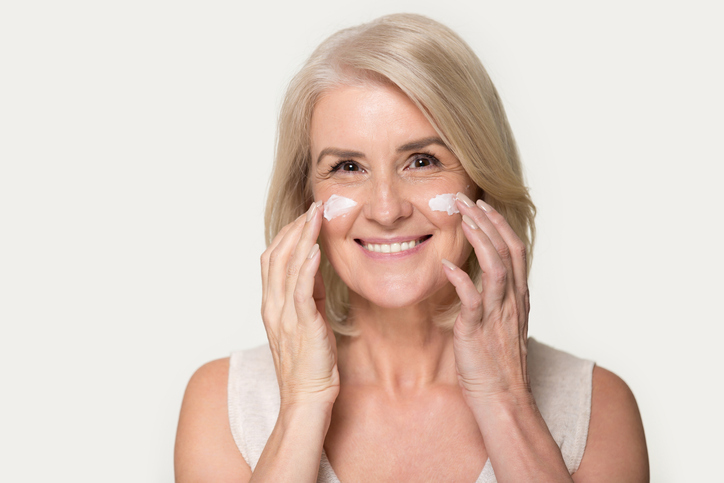
Your body undergoes many natural changes as you age. While everyone ages differently, it’s normal for your skin to feel drier, thinner, and more irritated. You may also become more susceptible to skin infections, bruise more easily, and heal more slowly. Age spots, wrinkles, and creases are typical as well.
If you notice a few things about your skin that you aren’t excited about, it may be helpful to adjust your skincare routine. Consider trying these dermatologist-recommended skincare tips for seniors to help you look and feel your best in your 60s, 70s, and beyond.
Alter Your Bathing Routine
A few simple adjustments to your bathing or showering routine can reduce the feeling of dry, itchy skin. Here’s what to try:
- Replace your bar soap with a gentle, creamy, fragrance-free cleanser.
- Use a soft washcloth instead of a pouf or bath brush, which can irritate sensitive skin.
- Consider bathing every two or three days instead of daily.
- Bathe in warm (not hot) water to avoid stripping your skin of its natural oils.
- Shorten your bath or shower to 10 minutes or less to prevent your fingers and toes from getting pruney.
- Pat your skin dry rather than rubbing it harshly to prevent irritation.
Add Moisture to Your Skin
Dry skin is a widespread problem among older adults. If you notice dry areas between your fingers, near your elbows, and elsewhere on your body, add moisture to your skin with these tips:
- Apply fragrance-free lotion within three minutes of bathing to help trap water against your skin. Continue putting on lotion throughout the day as needed to combat dry skin.
- Drink plenty of water to help keep your skin (and the rest of your body) hydrated. Unless your physician has restricted your fluid intake for medical reasons, you should strive to drink water frequently throughout the day. Buy a nice aluminum water bottle and keep it nearby to help you remember to take sips.
- Run a humidifier in the winter when the air is dry. This boosts indoor humidity to the ideal 45 to 60 percent range. When there’s more moisture in the air, less water evaporates from your skin, helping it stay soft and supple.
Go Fragrance-Free
Wearing perfume, cologne, and scented skincare products might boost your confidence, but artificial fragrances might irritate your skin. If you struggle with dryness and irritation, stop using scented products for a while to see if your skin health improves.
Wear Gloves While Doing Chores
Working around the house and in the yard can make your hands feel chapped. Prevent chemicals, germs, dirt, and sunlight from reaching your skin by wearing the appropriate gloves while completing housework and gardening. When you’re finished with your chores, remove the gloves, wash your hands, and apply lotion.
Guard Against Sun Exposure
As you age, it’s normal to develop wrinkles, sunspots, and blotchiness, but you can minimize their appearance by protecting yourself from the sun. Even if your skin already has these imperfections, it’s important to continue your sun-protection efforts to avoid developing skin cancer. Here’s what to do:
- Wear sunscreen whenever you go outdoors. Look for a broad-spectrum, water-resistant product rated SPF 30 or higher and apply it to exposed skin about 15 minutes before stepping outside.
- Seek shade whenever possible. After all, sunscreen doesn’t block 100 percent of the sun’s harmful rays.
- Don’t stay out too long during peak sun hours, which lasts from about 10 am to 4 pm.
- Wear a broad-brimmed hat and sunglasses to protect your face and eyes.
Check for Signs of Skin Cancer
About one in five Americans will get skin cancer in their lifetime. Anyone can develop it, regardless of skin color. Plus, cancerous skin cells usually develop very quickly, and the risk increases every year starting around age 50. Fortunately, as long as you spot it early, skin cancer is usually highly treatable.
That’s why dermatologists recommend conducting monthly skin self-exams. This involves scrutinizing every part of your body—including your palms, the soles of your feet, and your scalp and backside (with the help of a hand mirror). If you notice any moles of an irregular shape, color, or size, speak with your doctor.
At Parkwood Heights, we prioritize the health and happiness of our residents. That’s one reason why living here can improve your quality of life. Our scenic community is a lovely place to spend your retirement, with numerous opportunities to make friends, enjoy time with family, and get involved with activities and events. To learn more about what we have to offer, please contact us online or call us at (315) 986-9100.





